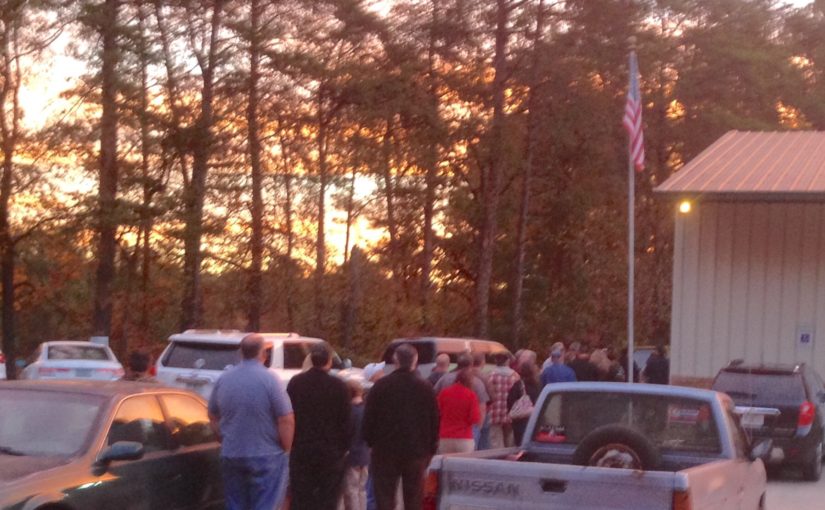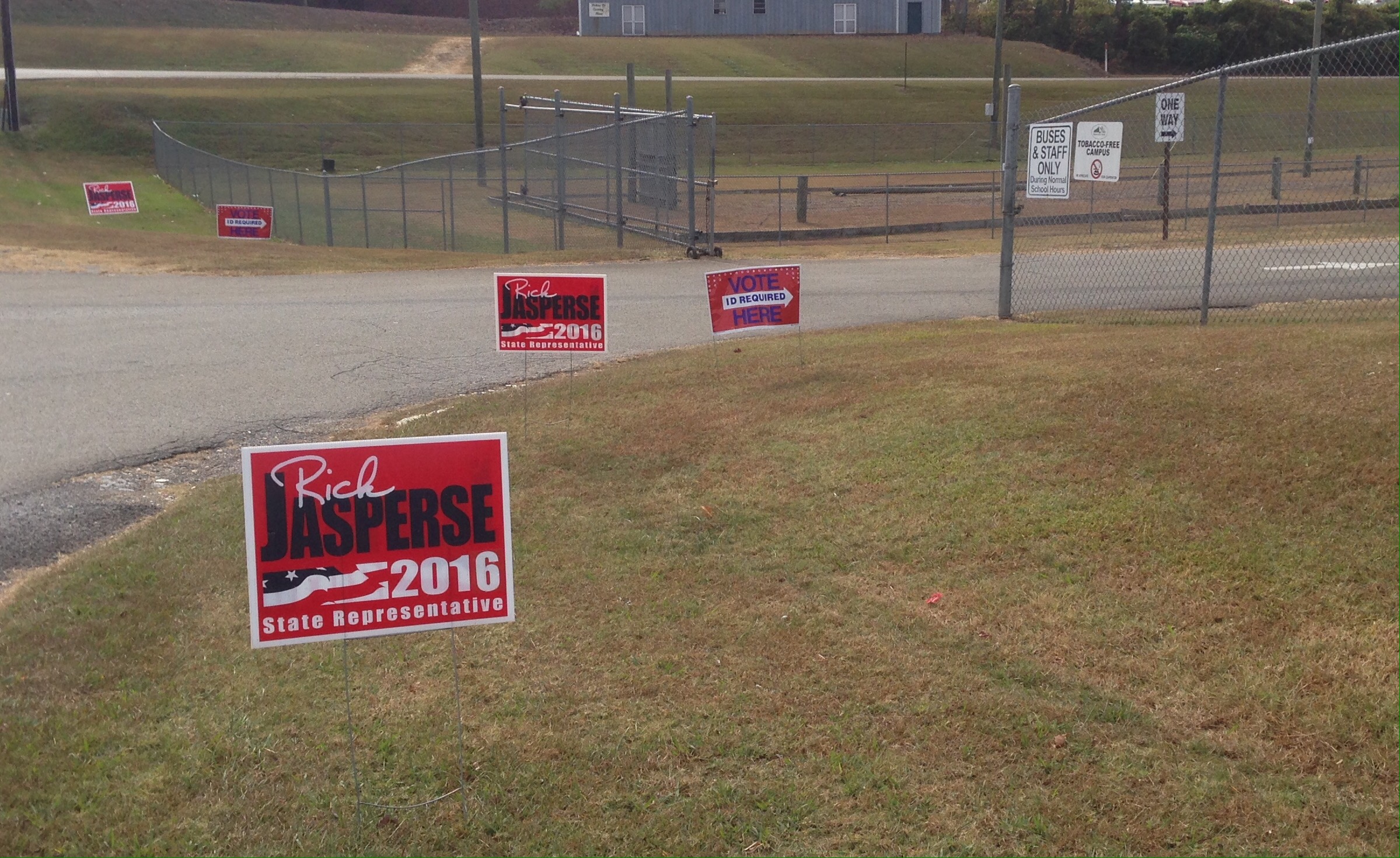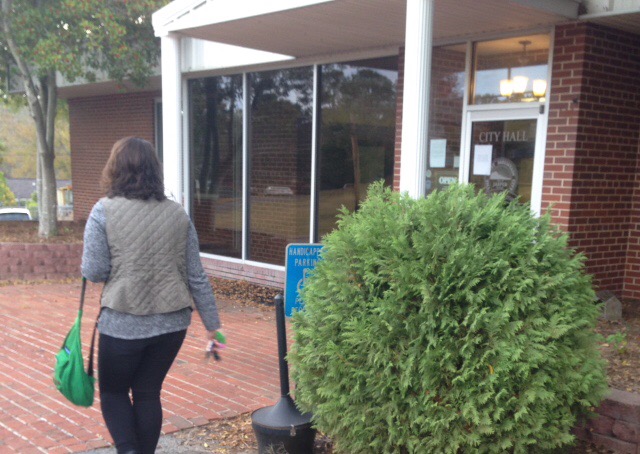Today’s penny is a 2000. That’s the first time that Donald Trump ran in a primary election, as a Reform Party candidate.
This post was updated throughout the day.
Noon. Back at our own polling station – now there’s no line, and the handicapped spot is visible and open. We go in to vote.
I fill out the form, show my ID. Check the polling station: Sample ballots displayed, line is moving steadily. I chat with the poll workers, they say all has gone smoothly, no provisional ballots needed.
A woman who’s in her late 20s is a first-time voter. The poll worker announces, “First-time voter!” And everyone applauds.
She stands behind me in line, so I congratulate her. She says, “Yeah, and I’ve been registered to vote for 10 years and didn’t even know it! I could have voted all those years. I guess I registered when I got my driver’s license but didn’t realize it. My mom was getting on my case. Then I find out I was already registered! So I’m finally voting.”
Bravo!
Earlier today I heard a surprising thing from another election worker – More than half the first-time voters at her precinct were elderly people. ‘You’d think they would be young people, but no – these were not young people!’ Hmmmm.
At last, a voting booth opens up, and it’s my turn. The poll worker escorts me into the room.
I don’t like how the voting is set up. I’m really uncomfortable.
All the machines stand with the screens facing inward, into the room, so they form a U on the three walls. The panels around the sides of the machines are only a few inches tall. I can block the view of my screen with my body; but when I glance a few feet across at another voter, I can see his screen.
Shouldn’t they have set up the machines so that the screens face the wall, and the voter stands with back to the wall, so that there is complete privacy?
I’m distracted because this is the moment I’ve been waiting for – I GET TO VOTE!
The poll worker is careful to point out to me and other voters that we should check the summary screen, make sure that the vote is what we wanted, before clicking on the button to cast the ballot. That’s a good practice, and I thank him for it.
It doesn’t take me long to vote. I check the summary carefully and notice that I inadvertently skipped one position. I go back and check my choice, then return to the summary. All good.
CAST BALLOT.
It is an emotional moment. I think, as I always do when I vote, of all the people around the world who cannot vote. Of all the people who walk great distances or put themselves in danger to vote, but they do it anyway.
What a privilege I have. I never take it for granted.
It’s not until I’ve left the station that I start thinking about this privacy issue of the voting machines.
I’m a poll observer, not a poll watcher. I don’t have a role that would entitle me to complain about the set-up of the machines. But I should have said something.
I do the next best thing: I report it to HQ. And I call the county board of elections.
The woman who answers there informs me that it’s actually Georgia law that the booths face inward to the room. It’s so the poll workers can see inside and be sure that the voter hasn’t left anything in the booth (like campaign literature).
That law was probably passed in the good old days, when voting was done in an actual booth with a curtain. But these machines with short panels on the side are nothing like those booths.
I tell the woman how I could see another voter’s screen, and frankly felt intimidated that someone might be looking at mine.
She said, “We get lots of complaints about this every year.”
What the hell? I think.
And every year, she says, the setup of the booths is inspected and found to be in compliance with Georgia law.
Wow.
Two possible solutions: Change the law – because, with these voting machines, it’s perfectly easy for the workers to check that the booth is clear when the voter leaves, no matter which way they are facing. Or, the Secretary of State’s office could buy taller panels to protect voter privacy.
I can hardly believe it. Voter privacy is one of the most important elements in the sanctity of the vote. Yet here we are, with our modern voting machines, violating privacy.
—
10:45 a.m. – Last of the five polling stations, at a church. It’s well-signed, plenty of parking, and it almost seems to have more handicapped spots than regular spots.
A guy with a badge comes out of the polling station. He sees us sitting in the car watching everyone. We decide to leave. He follows.
And follows. And follows. When he makes the last turn onto the rural road, I’m certain he is following me.
He follows me into the polling station parking lot and parks.
We get out. I make eye contact. He smiles and says, “I bet you thought I was following you!” “Sure did!” I said.
Turns out he’s an elections supervisor, checking on polling stations just like me. I introduce myself and tell him I’m a poll observer. We chat about how things are going.
Good. Smooth. No problems.
The board of elections had actually requested that the sheriff send some deputies around, just to keep an eye out and be there, so that anyone inclined to cause problems would then be disinclined.
“We want to be sure that everyone can vote,” he said.
Me, too.
I think back to the cashier at the store where we stopped a few minutes ago. I asked the cashier if she voted, and she said she hadn’t and wasn’t going to, “not unless I can vote for Mickey Mouse.”
That made me sad. Another voter lost.
—
10 a.m. – At the middle school, the signage is clear and does a good job of directing voters to the rear parking lot, where the polling station is. Several handicapped spaces, also clearly signed, are available. No line for voting; we peek into the open door to the polling station. All’s quiet. A sheriff’s deputy is hanging around, not in a threatening way mind you, just a presence.
I’m not sure about some of the candidate signs we see, though. They are outside the 150-foot boundary from the polling station, but they’re on public right-of-way. It’s not clear to me whether this is legal in my county; state law says signs can’t be on public right-of-way, but that counties and municipalities may pass ordinances allowing it in the right-of-ways for county and municipal roads.
I leave a message with the county elections office, asking about it.
I also see a couple of homemade Trump signs. They don’t have the required disclaimer for federal elections (indicating whether the sign was approved by the candidate, who paid for it, etc.). One of these signs is on a corner within what appears to be public right-of-way.
But who enforces this? Argh. So much that I still don’t know.
—
8:15 a.m. City Hall polling station: I am looking for the handicapped space. Can’t find one. Not in the upper parking lot, not in the lower parking lot.
I park and walk around. No space in sight. I go into City Hall and ask where the handicapped space is.
The young woman looks puzzled. “Right outside the front door there.” Huh? That’s a driveway.
“The handicapped parking is there. A big sign.”
I go out and look. The permanent Handicapped Parking sign is obscured by the shrub. Not visible unless you’re right next to it.
I write in to report this to state headquarters. As I’m typing it, a truck parks next to us. An old bearded man gets out with a walker and struggles very slowly down the steps, with an assist from the truck’s driver, his nephew.
Now I’m mad.
When the man comes out, I ask the nephew whether he was aware that there was a handicapped space in front of the door. He wasn’t.
I went up to the man and asked, “How did it go in there? Did you have any trouble voting?”
“I didn’t vote,” he said gruffly.
What? Why? He said he’d moved and he was told hehad to vote at another precinct.
“You could have voted a provisional ballot,” I said. A registered Georgia voter can vote for federal offices in any precinct.
“I’m not gonna vote,” he growled.
I kept talking to him while his nephew drove the car up to pick him up. I asked him how I could help. I asked if he needed another ride to get to the correct precinct. I pleaded with him.
He threw his walker in the back of the truck and got in. “I’m not gonna vote.”
“You can still vote until 7, if you change your mind,” I said. He didn’t answer.
I walked away in tears of frustration.
Meanwhile, staff at headquarters had called me back. I was to talk to the polling station manager about the handicapped space. I took Tom in with me.
Kathy was very nice, very professional. She said most people who vote at this precinct know where the handicapped spot is, but she agreed that it wasn’t right that the sign was obscured. We went out together and looked at it, and she said she’d have a temporary sign put up in a more prominent place.
I raised the issue with the old man not voting. She said he wouldn’t fill out a change of address form and he couldn’t vote provisional unless it was so late in the day that he couldn’t get to his home precinct. I said that wasn’t how I understood the law. The conversation was polite and we agreed that we would both check on the law.
I went back outside to report to HQ again, and as I did, three workers came out of City Hall. They pulled up the obscured parking sign – the permanent one that’s in the ground on an iron post – and moved it to a prominent position.
I went up to thank them. “We’re gonna put up a second one, over there, too,” the boss said. “What do you think?”
I was stunned. “That would be great!” A permanent fix. Because we said something.
I went in to thank Kathy. I also told her the code citation about provisional ballots for people in the wrong precinct – Georgia 21-2-418, subsection A, which does not specify a time for allowing people to vote anywhere. HQ told me that the voter is the one who decides whether they can get to their home precinct.
Kathy disagreed. “His nephew would have taken him there. He didn’t want to go.”
How come? “He said he was uncomfortable going there.” Why? She shook her head.
A mystery. Could be a million reasons. Maybe he’s got kin in that neighborhood that he’s mad at. Maybe he got beat up at that school as a kid. Maybe he doesn’t want to walk so far up the ramp to the polling station.
But as far as I can tell, he had the right to vote at City Hall this morning. And wasn’t allowed to.
For the rest of my life, I’ll wonder if that man voted today.
–
7:55 a.m. – Just watched a father come out of the polling station with his young daughter. She held the Georgia Peach -“I voted” sticker while he took a selfie of the two of them.
When we pulled in at this elementary school, we couldn’t find the handicap space. I was amazed. We drove through the lot, and finally parked.
We sat and observed for awhile while I reported to HQ the lack of handicapped parking spaces. We tracked the time it took for voters to come back out – typically it was 14 to 17 minutes.
Trucks and cars came and went. Then I got a text from HQ: “Please follow up with a new report if the handicapped access issue is not resolved.”
Right around then, we saw the portable handicapped parking sign. It had been visually lost in a sea of trucks.
And as I replied to the text from HQ, a man came out from the polling station and moved the sign to where it was clearly visible – and right next to the ramp.
Mission accomplished.
—
7 a.m. The poll station manager comes to the door and says loud and clear, “The polls are now open.”
Tears come to my eyes. The day is here. The election has begun. All is calm. A line of 40 people are already waiting to vote at our small rural station.
Parking is jammed and no one is controlling the parking lot. It is hard to see the handicapped spaces. That is the only apparent problem.
We had intended to vote right away, but decided to go on to check another polling station and see if there are problems.
—
6:25 a.m. – We are in the last stages before we walk out the door. We were up at 5 a.m. to get to the first poll before opening at 7.
Tom, Ann and I are poll observers today. Keeping the county safe for voting.
We will be watching for intimidation or disruption at five polling stations, and we’re on call to go to other polls.
I keep thinking: The price of liberty is eternal vigilance.



NH is having a policeman at each polling station as well.
Yeah, our county asked the Sheriff’s dept to check in at the polling stations too. They were a visible but low-key presence.
This account is deeply touching and inspiring, particularly how much you care that everyone is given an equal opportunity to express their right to vote, and you’re right – we are very lucky. People in other countries risk their lives to vote and oftentimes those votes are not counted anyway. I voted in Afghanistan during the first election, and I’ll send you my story of it.
Thanks, Homira – I would love to read that! I really do treasure the right to vote.
The busiest person i know, but you made time for this. Brava.